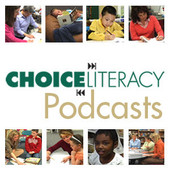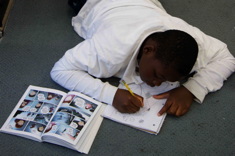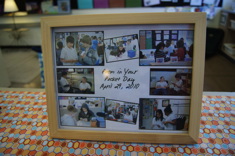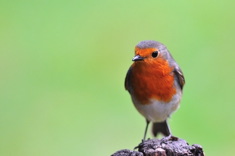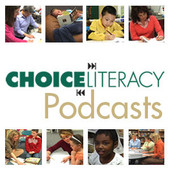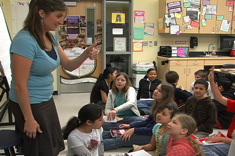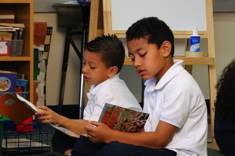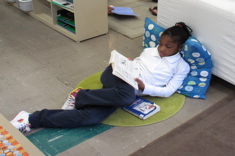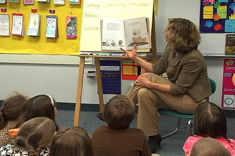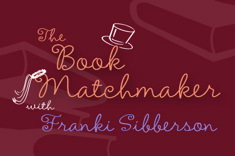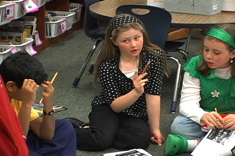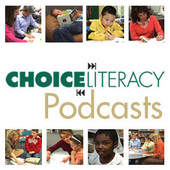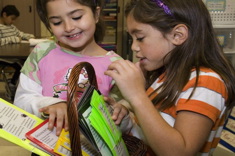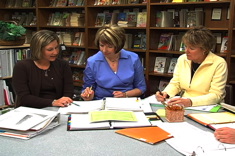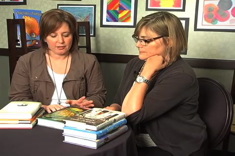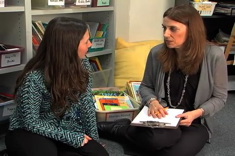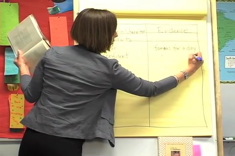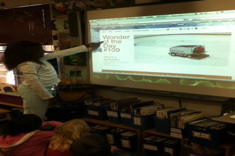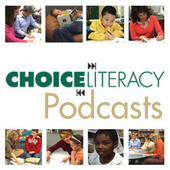Library
Choice Literacy Articles & Videos
The Choice Literacy library contains over 3,000 articles and 900 videos from 150+ contributors. Classic Classroom and Literacy Leadership subscribers have access to the entire library. Content is updated continuously, with five to six new features published each week.
Latest Content
Jigsaw Jones and Advocating for Kids: A Conversation with James Preller (PODCAST)
Popular children's book author James Preller talks about his series Jigsaw Jones and being an advocate for kids.
New Fiction for Boys (BOOKLIST)
It takes a kid at heart to share what young boy readers would take to heart, and Tony Keefer is just the guy for the job. Tony loves whonunits, blood ‘n’ guts, and cliffhangers, and he shares that passion with his tween students in this fiction booklist for boys.
How to Look at Student Work
With summaries as an example, Heather Rader uses trends from learners to help make smart instructional decisions about what is presented during whole group, small group and individual time.
An Attitude of Gratitude
Heather Rader gets three nasty emails, and thinks through how to hold on to an attitude of gratitude when dealing with colleagues who are short-tempered or demanding.
Poetry Fridays (and So Much More) for Students and Staff
 Mary Lee Hahn finds Poetry Fridays are about so much more than poetry, or even a pleasant end to the week. She shares how this activity is a wonderful way to bring together colleagues and students.
Harbinger
Shirley McPhillips draws parallels between a tentative, battered robin in the snow and the fragility of teachers in the spring.
Coaching Monkey
Heather Rader has advice for literacy coaches looking for honest appraisals of their work from colleagues.
Writing Triage: Dealing with Dialogue Disasters
Is there a dialogue doctor in the house? If your students’ writing is filled with dull exchanges, you’ll enjoy these lesson suggestions from Heather Rader.
Catching Struggling Readers Before They Fall with Pat Johnson and Katie Keier (PODCAST)
Pat Johnson and Katie Keier share their thoughts on how a comprehensive literacy approach best meets the needs of all learners, especially those students who struggle.
Tech Tools for Our Youngest Learners with Kathy Cassidy (PODCAST)
Kathy Cassidy has the tips and tools of the trade for increasing technology in developmentally appropriate way for little ones.
The Triple Threat: Building a Community, Discussion Skills, and Writing Stamina
Katie Doherty knows how to pick the right text to move from whole-class conversations to writing.
Writers, Choice and Independence (Part I)
What does true independence look like among young readers and writers? A chance comment from a visitor to Aimee Buckner's classroom gets her pondering the amount of choice children have during units of study.
Sense of Little Engines
Heather Rader writes about "agency" – the challenge of letting students and teachers take charge of their learning. In concrete examples from a third-grade classroom and a professional development scoring session with teachers, Heather shares the subtleties of learning to trust, wait, and celebrate when learners of any age are responsible and independent.
Poetry Possibilities
Shari Frost shares literacy activity suggestions and a booklist of her favorite poetry anthologies.
Raising Readers: Independent Reading, Choices, and Intentional Reading Practices
How can teachers promote good independent reading choices for English language learners? Stella Villalba has suggestions.
Fireflies: Then and Now
Andrea Smith watches her young daughter capture fireflies in the twilight of a summer night. The evening reminds her of what’s changed in connecting literacy and life experiences, and what endures for teachers and kids.
Motive, Means, and Opportunity
When educators have literacy-rich environments at home, it is important to consider students' daily access to reading materials. Ellie Gilbert uses motive, means and opportunity to think about our literacy landscapes.
Favorite Short Mentor Texts for Demonstration Lessons
For teacher leaders who are called upon to do demonstration lessons, here is a “must-have” list of short, potent books.
Virtually Coaching a Lesson
Coaching cycles look different depending on teachers' needs. Via email and phone, Heather Rader has professional conversations with a teacher as he plans and designs a lesson for observation.
Book Matchmaker: Texts for 5th Grade English Language Learners
Finding high interest books for English language learners in the upper elementary grades can be a challenge. Franki Sibberson shares some of her favorites.
A More Literate Show and Tell
Tammy Mulligan and Clare Landrigan work with a kindergarten teacher to integrate literacy skill development into this favorite routine of young children.
Sharon Taberski on Comprehension Instruction (PODCAST)
In this podcast, Sharon Taberski chats with Franki Sibberson about comprehension instruction across the grades.
Books that Invite Students into Poetry Writing
Are your students stuck on writing poems that rhyme? Franki Sibberson shares some of her favorite mentor texts for lifting the quality of student poems.
Tips from Literacy Leaders for Closing Out the School Year (ROUND-UP)
Here are some suggestions from Choice Literacy Contributors of the best ways to close out the year, with everything from personal organizing tips to family events.
Best Practices All Day Long: Balancing Personal and Professional Success
If you’ve ever experienced that disequilibrium of feeling completely organized in your professional life, and hopelessly scattered during your personal time, you’ll enjoy Melanie Quinn’s reflective essay.
Transitioning to Guide on the Side: Facilitating Collaborative Scoring
Heather Rader wants to transition to more of a guide-on-the-side role as she coaches colleagues. Here are some simple strategies she uses to move offstage during collaborative scoring workshops.
A Closer Look at Anchor Charts
Shari Frost has a gift for helping us think about purpose and this article is no exception as she turns her attention to the benefits of intentional anchor charts.
Wonderopolis: Nonfiction, Technology, and Web-Based Independent Learning
Wonderopolis hits the sweet spot so many of us are looking for in web resources for students, delivering free, engaging, high-quality nonfiction text and video in small chunks that can easily be integrated into literacy and science workshops. Andrea Smith explains how she uses Wonderopolis daily with her students.
Patrick Allen on Conferring (PODCAST)
Patrick Allen talks about the value of conferring, and what he does to build his conferring skills.
Spring Slump
Audrey Alexander takes a close look at a couple of the students in her self-contained resource room, and finds the observations renew her flagging energy.
Browse Content By
Type
Category
- Assessment Tools
- Big Fresh Archives
- Booklists
- Choice Numeracy
- Classroom Design
- Common Core
- Community Building
- Conferring
- Content Literacy
- Digital Literacy
- English Language Learners
- Equity
- Family Relations
- Free Samples
- Guiding Groups
- Leadership
- Literacy Coaches
- Mentor Texts
- Minilessons
- New Teacher Mentors
- Podcasts
- Poetry
- Quote Collections
- Reading Strategies
- Self Care
- Struggling and Striving Learners
- Talking and Listening
- Teacher Study Groups
- Teaching Reading
- Teaching Writing
- Word Study and Vocabulary
Author
- Melissa Quimby
- Nawal Qarooni
- Gwen Blumberg
- Julie Cox
- The Lead Learners
- Hannah Tills
- Josie Stewart
- Ruth Metcalfe
- Mallory Messenger
- Becca Burk
- Jodie Bailey
- Vivian Chen
- Mary Brower
- Tiffany Abbott Fuller
- Stephanie Affinito
- Ruth Ayres
- Leigh Anne Eck
- Heather Fisher
- Shari Frost
- Julie Johnson
- Suzy Kaback
- Gigi McAllister
- Shirl McPhillips
- Melanie Meehan
- Cathy Mere
- Debbie Miller
- Tara Barnett and Kate Mills
- Tammy Mulligan
- Dana Murphy
- Bitsy Parks
- David Pittman
- Brenda Power
- Heather Rader
- Matt Renwick
- Mandy Robek
- Christy Rush-Levine
- Gretchen Schroeder
- Jen Schwanke
- Brian Sepe
- Katherine Sokolowski
- Stella Villalba
- Jennifer Vincent
Grade Level
Choice Literacy Membership
Articles
Get full access to all Choice Literacy article content
Videos
Get full access to all Choice Literacy video content
Courses
Access Choice Literacy course curriculum and training

